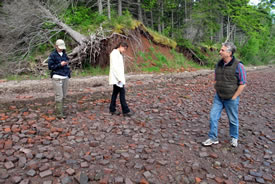Three important environmental skills you can only gain through hands-on work

Danielle Horne (NCC), Jamie Fraser (NCC) and John Caraberis on the brick beach, NS (Photo by NCC)
I have always wanted a job that allows me to work outside. Last summer, I was one of the lucky few students to have an internship with the Nature Conservancy of Canada (NCC).
In an average work week, I spent two to three days working in the field. Having a hands-on internship allowed me to develop skills essential for pursuing a career with any kind of ecology-based fieldwork. Here are the three most important skills I learned from a summer in the field:
1. Species identification
Plants, birds, animals, fish, you name it. Trying to learn what these things look like, smell like and sound like is extremely difficult to do while inside. Trust me, I’ve tried it. Look at pictures all you like, listen to bird calls repeatedly and annoy the rest of the office — the only real way to develop species identification skills is to get out in the field.
Sounds, smell, taste and environment are important factors when identifying species.
2. Ecosystem classification
Ecosystem classification is an important tool used for making decisions about the management of an area. Although there are computer-based models that can predict ecosystem types, field visits are always necessary to confirm or correct the computer models. Like species identification, the ability to identify what type of forest, field or wetland you are looking at can only really be learned through first-hand experience.
Each ecosystem type has a different feel, look and sometimes smell; all senses you can’t get from studying books.
3. Fostering local connections
Interacting with landowners, community members and volunteers can provide important information about the environment you are working in. Locals often have historical knowledge that has not been recorded in reports and may be important to the management of a property. They also may have more knowledge of various species on the property and if their populations or behaviours have changed over time.
Making connections with community members is a key aspect of the Nature Conservancy of Canada’s operations. Engaged members may donate land, money or time through volunteer work or property stewardship. These donations are essential for a non-profit organization like NCC. Not to mention, locals also know all the good spots for lunch.
Hands-on internships such as mine are especially valuable to young professionals and recent graduates who have had few opportunities to learn through experience. I am extremely grateful and lucky to have worked for the Nature Conservancy of Canada. The amount of new information and knowledge I acquired is amazing!
I have no doubt that my internship with NCC has provided me with many transferrable skills I can use to further my career in the environment industry.


